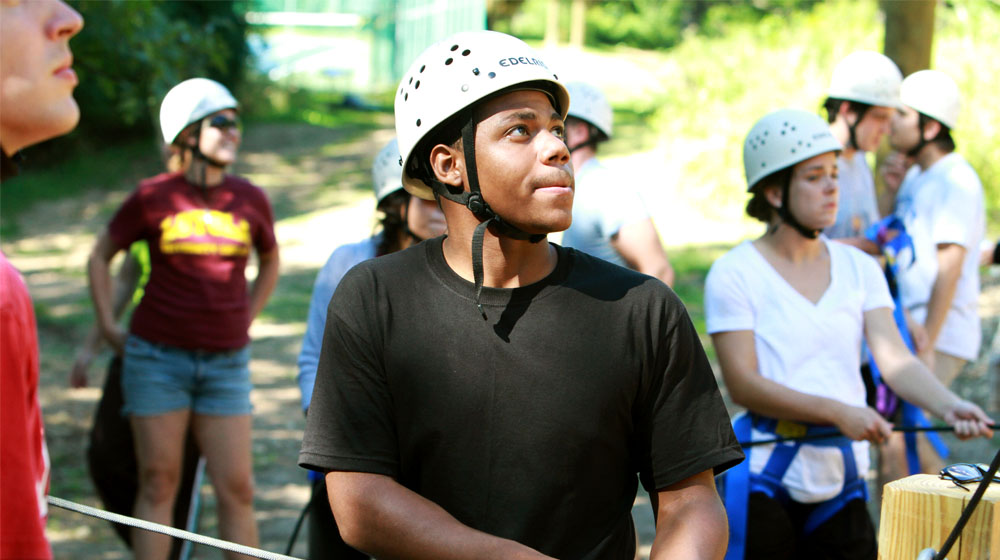Progression Components in Detail

We are currently not offering our Challenge Course.
Initiatives
Group initiatives and low and high ropes elements are the “curriculum” that we use to ensure that the team building experiences offered at LUREC move beyond recreation and into education.
Introductory initiatives include name games and activities that get group members moving, talking, sharing with one another and developing a bond or enhancing existing relationships.
- This portion of a program orients participants to where they are, why they are at the LUREC challenge course and develops their understanding of what they will be experiencing
Beginning initiatives introduce activities that call upon the group to plan, set goals, implement their ideas, try out leadership/follower/collaborator roles, reflect upon how the group is performing and begin to move towards higher functioning and the development of working relationships among group members
- During these activities, participants are provided tools that assist them in setting and overcoming challenges as a group, making use of the skills of all group members and recognizing where and why they might be failing to utilize all of the resources within their group
Advanced initiatives push the group to perform and work through roadblocks to success by utilizing the skills they have developed. Group members are encouraged to step outside of their typical role within their group in order to prepare themselves for continued high levels of performance after their program
- By placing the responsibility for success on group members, learning becomes heightened as groups take ownership over their successes and failures and the processes they have used to get there
Elements
Low ropes elements take many forms and the LUREC campus has 15 unique options. Low ropes elements move the action off of the ground as group members traverse cables affixed to trees, collaborate to move through obstacles and add a more physical aspect to the experience. These elements are close enough to the ground that safety systems such as harnesses and ropes are not necessary but spotting and close attention to the physical safety of one another does come into play.
- These elements help group members to build trust in one another in a controlled environment by introducing the need for mutual emotionally and physically support
High elements at LUREC include a climbing tower, team-focused high ropes course (participants traverse elements in pairs), individual challenge high ropes course and multiple high elements that can be adapted to specific learning outcomes. High elements provide a shift of focus within a program by moving outside of group work and towards individual or paired participant challenges and achievement.
- High elements offer groups and individuals the opportunity for challenges that are physical in nature but require encouragement, support and mutual trust to succeed at—key aspects of any high functioning group
For more information, contact Lynda Harrison at lharrison3@luc.edu or 773.508.2317.
We are currently not offering our Challenge Course.
Initiatives
Group initiatives and low and high ropes elements are the “curriculum” that we use to ensure that the team building experiences offered at LUREC move beyond recreation and into education.
Introductory initiatives include name games and activities that get group members moving, talking, sharing with one another and developing a bond or enhancing existing relationships.
- This portion of a program orients participants to where they are, why they are at the LUREC challenge course and develops their understanding of what they will be experiencing
Beginning initiatives introduce activities that call upon the group to plan, set goals, implement their ideas, try out leadership/follower/collaborator roles, reflect upon how the group is performing and begin to move towards higher functioning and the development of working relationships among group members
- During these activities, participants are provided tools that assist them in setting and overcoming challenges as a group, making use of the skills of all group members and recognizing where and why they might be failing to utilize all of the resources within their group
Advanced initiatives push the group to perform and work through roadblocks to success by utilizing the skills they have developed. Group members are encouraged to step outside of their typical role within their group in order to prepare themselves for continued high levels of performance after their program
- By placing the responsibility for success on group members, learning becomes heightened as groups take ownership over their successes and failures and the processes they have used to get there
Elements
Low ropes elements take many forms and the LUREC campus has 15 unique options. Low ropes elements move the action off of the ground as group members traverse cables affixed to trees, collaborate to move through obstacles and add a more physical aspect to the experience. These elements are close enough to the ground that safety systems such as harnesses and ropes are not necessary but spotting and close attention to the physical safety of one another does come into play.
- These elements help group members to build trust in one another in a controlled environment by introducing the need for mutual emotionally and physically support
High elements at LUREC include a climbing tower, team-focused high ropes course (participants traverse elements in pairs), individual challenge high ropes course and multiple high elements that can be adapted to specific learning outcomes. High elements provide a shift of focus within a program by moving outside of group work and towards individual or paired participant challenges and achievement.
- High elements offer groups and individuals the opportunity for challenges that are physical in nature but require encouragement, support and mutual trust to succeed at—key aspects of any high functioning group
For more information, contact Lynda Harrison at lharrison3@luc.edu or 773.508.2317.
